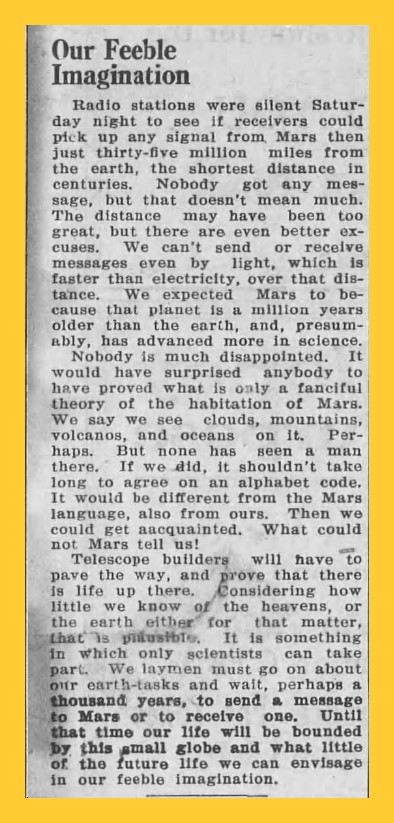
In responding to the fact that no one had received any radio messages from Mars during the time the red planet was closest to earth in 1924, the Lykens Standard of August 24, 1924, noted that it would probably take a thousand years before a message could be sent to Mars or for a message from Mars to be sent to earth.
OUR FEEBLE IMAGINATION
Radio stations were silent Saturday night to see if receivers could pick up any signal from Mars then just thirty-five million miles from the earth, the shortest distance in centuries. Nobody got any message, but that doesn’t mean much. The distance may have been too great, but there are even better excuses. We can’t send or receive messages even by light, which is faster than electricity, over that distance. We expected Mars to because that planet is a million years older than the earth, and presumably, has advances more in science.
Nobody is much disappointed. It would have proved what is only a fanciful theory of the habitation of Mars. We say we receive clouds, mountains, volcanos, and oceans on it. Perhaps. But none has seen a man there. If we did, it shouldn’t take long to agree on an alphabet code. It would be different from the Mars language, also from ours. The we could get acquainted. What could not Mars tell us!
Telescope builders will have to pave the way, and prove that there is life up there. Considering how little we know of the heavens, or the earth either for that matter, that is plausible. It is something in which only scientists can take part. We laymen must go on about our earth-tasks and wait, perhaps a thousand years, to send a message to Mars or to receive one. Until that time our life will be bounded by this small globe and what little of the future life we can envisage in our feeble imagination.
_________________________________________________
From Newspapers.com.
Corrections and additional information should be added as comments to this post.